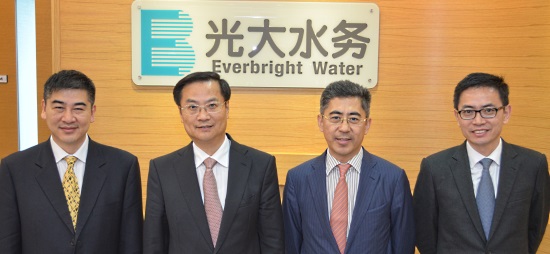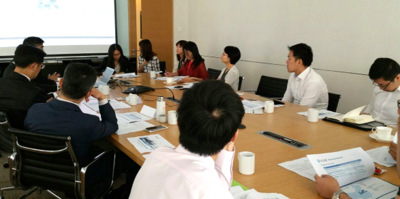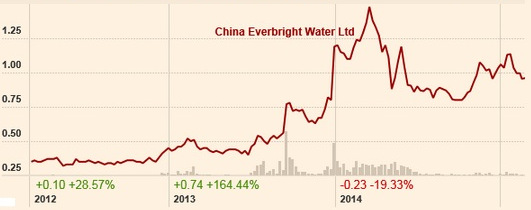 L-R: CFO Felix Yau, Vice-Chairman & CEO Wang Tianyi, Vice-Chairman David Chen and Standing-President An Xuesong. Photo by Sim Kih
L-R: CFO Felix Yau, Vice-Chairman & CEO Wang Tianyi, Vice-Chairman David Chen and Standing-President An Xuesong. Photo by Sim KihCHINA EVERBRIGHT INTERNATIONAL spun off its environmental water business (China Everbright Water) through a reverse takeover of HanKore Environment on 12 Dec 2014.
It reported its full-year 2014 results last week. The following are among the key takeaways from the results briefing:
 Everbright Water's briefing last week. Photo by Ngo Yit SungFinancials
Everbright Water's briefing last week. Photo by Ngo Yit SungFinancials1. FY2014 revenue was down 19% to HKD1.1 billion but gross profit (HKD 596.5 million) and margin were higher y-o-y because of a change in revenue mix -- there was a larger contribution from waste water treatment and lower contribution from construction services.
The gross margin at 56.7% was impressive, rising from 41.0% a year earlier.
2. The P&L reflects less than one month's business performance of HanKore as the reverse takeover was completed in Dec 2014. Thus, this year will see the full revenue and profit contribution of HanKore added to Everbright Water.
3. Net profit growth was 10% to HKD292.8 million, which would have been higher if not for RTO expenses and HanKore's financing costs, etc.
China Everbright is seeking to refinance HanKore's projects at a lower cost of capital.
4. Though the P&L reflected less than one-month's contribution, the balance sheet is that of the entire merged entity as at end-2014.
5. Its gearing dropped from 0.35 to 0.18 and is expected to fall further when a placement exercise (to International Finance Corporation and Dalvey Asset Holding) is completed in the next few months.
|
|









